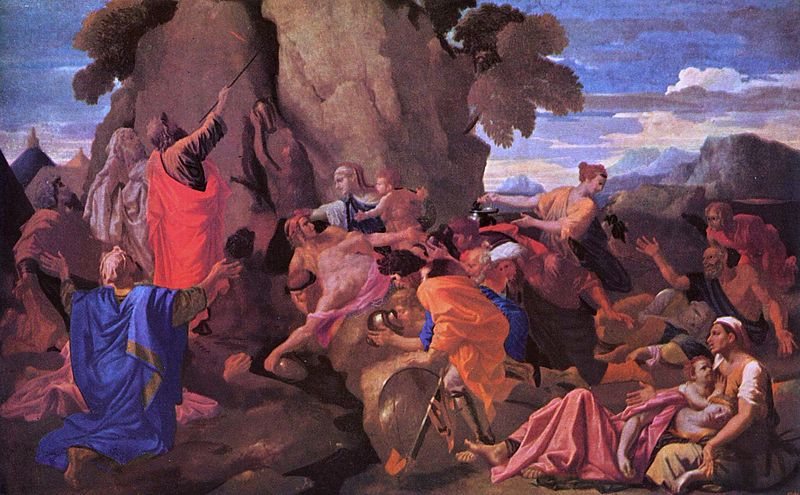
“Moses Striking Water from the Rock” by Nicolas Poussin, 1649
by Phyllis Chesler
This is far more magical and mysterious than the Beatle’s psychedelic Magical Mystery Tour album. I am referring to our Torah scroll which is full-to-bursting with mysteries and miracles, with God’s masterful magic (Creation and overturning Nature), and with people who can hear and talk to God. From the beginning, we enter or return to a garden in which there are talking animals—a snake with whom Chava speaks; even before Creation, there were sea-creatures that were so large that God could not allow them to procreate—and so God saves and koshers the flesh of one (Leviathan) to feed to the righteous at the end of days; angels are visible, a bush can burn without being consumed; God turns walking sticks into snakes or almond blossoms and eerily, awesomely, manages the death of every first-born living creature in Egypt—a phenomenon for which there can only be only one explanation none other. Once out of Egypt, we have yet another sea creature, is it a dolphin or a seal? that can be found in the desert, (I am talking about the tachash), whose skin we require as part of the covering of the mishkan. In this week’s parsha, we have a rock from which water gushes forth; and we have the famously elusive red heifer, the para adumah (19:2).
Walt Disney would have a field day with animating all this. Truly, it is the Greatest Story Ever Told. What is going on? Are we really meant to learn that faith demands that we follow a statute, even when it is impossible to do so, when no pure red heifer can be found? And, can a pure red-complexioned cow really exorcise impurity? Can a morally impure person be both defiled and cleansed by the ashes of a non-existent heifer? Are we also supposed to believe that the reason Moshe will never obtain his most ardent wish—to enter the Promised Land—is because he struck the rock with his rod, and did not speak to it? I think not.
Here is a lesson for all time, for all of us, namely that even God’s chosen and most intimate mortal servant, does not obtain his dearest wish, even Moshe can only go so far and no further, that performing the avodah, the work, the “service,” is its’ own and greatest reward; that is what “service” is, so that others, the coming generations, not ourselves, may live to see the fruits of our labor.
- Like
- Digg
- Del
- Tumblr
- VKontakte
- Buffer
- Love This
- Odnoklassniki
- Meneame
- Blogger
- Amazon
- Yahoo Mail
- Gmail
- AOL
- Newsvine
- HackerNews
- Evernote
- MySpace
- Mail.ru
- Viadeo
- Line
- Comments
- Yummly
- SMS
- Viber
- Telegram
- Subscribe
- Skype
- Facebook Messenger
- Kakao
- LiveJournal
- Yammer
- Edgar
- Fintel
- Mix
- Instapaper
- Copy Link









